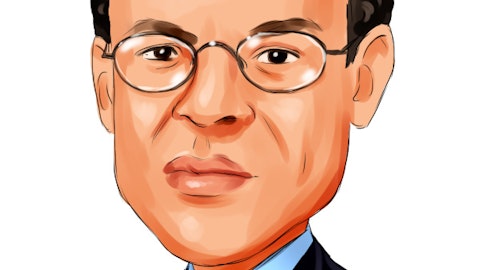Dave Byrnes: You’re welcome.
Operator: And your next question comes from the line of Devin Brisco from Wolfe Research. Your line is open.
Devin Brisco: Thanks for the question. Could you talk a bit more about the decision to explore sale of Tao Group. Why is now the right time to undergo this process? Is part of the rationale to use proceeds to fund construction of the Sphere or other Sphere initiatives? And if not, what are your capital allocation plans with proceeds assuming a sale is completed?
Dave Byrnes: Sure. Thanks, Devin. As I just mentioned, since we bought the majority interest in Tao in 2017, it’s transformed into the global powerhouse that it is today and it’s clearly reflected in its financial results. And as you know, this company, our Board, our management team, have a track record of regularly exploring ways to maximize shareholder value. We believe that now is the appropriate time to explore a potential sale of our interest in Tao. And in terms of the use of the proceeds from the potential sale, let me start by saying that we are comfortable with the fact that we have the appropriate liquidity to complete construction of MSG Sphere in Las Vegas. We have substantial cash on the balance sheet. Our business is generating positive operating cash flow and we have revolver capacity, if needed.
And with the recent cost reduction program that we just completed, including at MSG Networks, our business is even on stronger ground today. So, typically, we move forward with the sale. The sale would provide — the sale of Tao would provide SphereCo with enhanced financial flexibility, period. We can see those proceeds benefiting all businesses at SphereCo, as that entity, really, after the spin-off evaluates opportunities to appropriately allocate capital.
Devin Brisco: Thanks. And I have a second question on MSG Networks. As you move closer to a D2C launch, how are your discussions with linear distributors progressing? Will the D2C launch cannibalize affiliate rates at all, or is there a way to protect linear streams, while also reaching incremental consumers outside the bundle?
Andrea Greenberg: Thanks for the question. Well, as to our current distribution partners and we’ve indicated before, that we have the flexibility in our existing agreements to offer this D2C product in the way we contemplate. However, we remain very, very mindful of our traditional linear business, and those important partnerships, including the value that we derive from those very important partnerships. We’ve indicated that we’ll have more to say about the product including the pricing of the product in the very near future. That said, we believe there remains continued value in the bundle. And our D2C offering, including our pricing for that offering, we’ll most certainly take that into consideration.
Devin Brisco: Thank you.
Ari Danes: Thanks, Devin. Operator, we’ll take one last caller.
Operator: Your final question comes from the line of Paul Golding from Macquarie Capital. Your line is open.
Paul Golding: Thanks, so much. I wanted to ask first off, if we could get a little more color on the cost reduction program, the headcount reductions? I know you mentioned it’s across entertainment and networks. I guess, where did you see the opportunity to cut costs? And in each of those, maybe more specifically on what drove that? And then a follow-up around the spin. More or less, what kind of sort of background could you give on the SpinCo capital allocation strategy going forward, post spin, we’ll have the legacy entertainment business. But — just trying to understand, where you go from capital allocation from there. Thanks.





